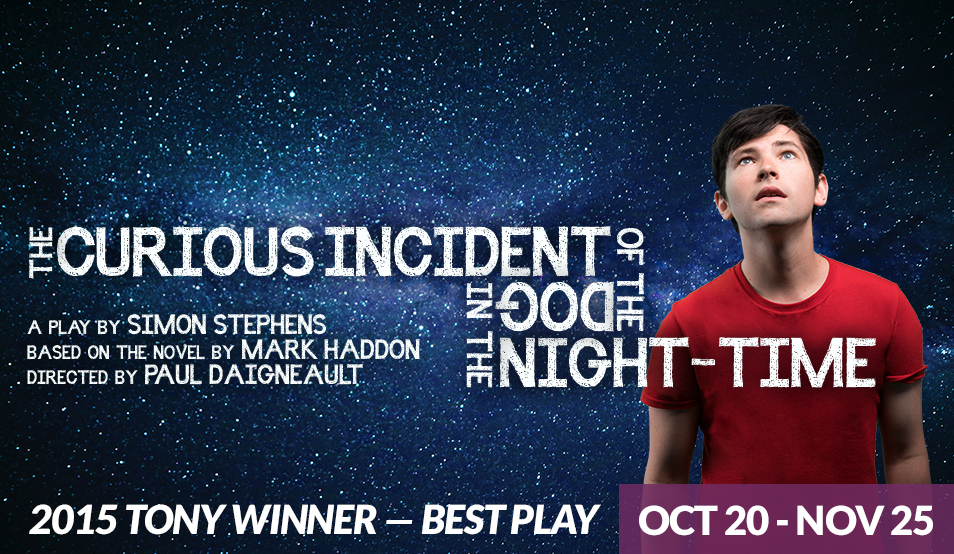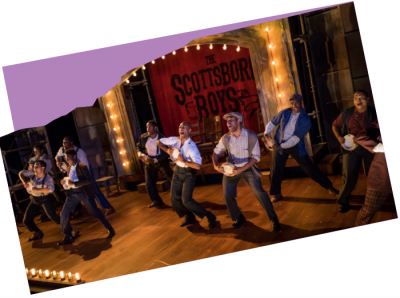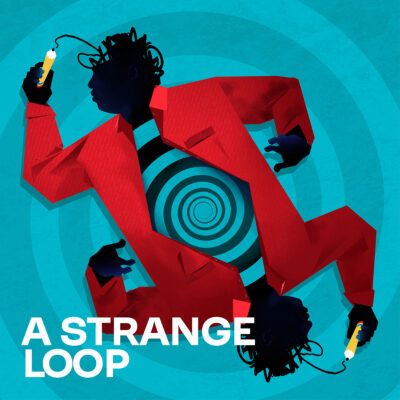Your donation sets the stage for a new season of Boston's most intimate, entertaining and provocative plays and musicals. Our shows make powerful connections with our audiences-- and they are only possible because of you.
Interview with Playwright Simon Stephens




Interview with Playwright Simon Stephens


In 2003, British author Mark Haddon had his first novel published. It was called The Curious Incident of the Dog in the Night-Time, a peculiar title for a story that would soon become one of the best-selling, most studied, and most beloved of the 21st century. After being approached dozens of times for the stage rights to the story, Haddon finally found his playwright in Simon Stephens – a prolific playwright known for his explorations of dark and disturbing themes. The collaboration fostered a work so brilliant, it’s nearly impossible to believe that Curious Incident was Haddon’s first novel and Stephens’ first adaptation.
It’s been five years since Simon Stephens’ theatrical adaptation of Curious Incident premiered in London, and he has yet to grow weary of discussing Haddon’s writing, Christopher’s mind, or the future life of the play. Jennifer Morris, Assistant Director of SpeakEasy’s production, spoke by phone with Mr. Stephens from across the pond to find out more about how this Tony and Olivier Award-Winning play came to be.
Jennifer Morris: After studying History at university and spending time as a musician, at what point in your career did you decide to be a full-time playwright?
Simon Stephens: I always say people go into writing for the theatre from one of two routes. They either start as an actor trying to get themselves a role, and find themselves writing the role and enjoying the writing more than they enjoy the acting. Or, they’re writers who stumble upon the theatre as the form that most aptly articulates what they want to say. I was definitely the latter. I wanted to be a writer of sorts since the age of about 9. When I was a teenager, I mostly wanted to be a songwriter, and it took me until my early 20s to realize that I had a really wretched singing voice and was never going to make it as a singer-songwriter. My time at university was the first time I ever saw any serious theatre, and I became – for want of a better word – intoxicated by the potential of the form, with its combination of unpredictability and volatility and language.
JM: How did you first meet Mark Haddon and get involved with Curious Incident?
SS: I was a resident dramatist at the National Theatre Studio at the same time [Haddon] was on an 8-week attachment. We just met each other there, hung out together, and had a huge amount in common. We spent a couple of years where I was reading the stuff he was trying to write for the theatre, and he would read early drafts of my plays and things like that. Then he just rang me one day and asked if I would think about adapting [the novel]. He tells me he was approached 100 times or so for the stage rights, and had always kind of resisted selling them. He got to the point where he knew that eventually, somebody was going to stage the play, and he wanted to have some kind of ownership over that staging. He wanted someone he trusted and someone he knew. He wanted someone whose work he liked, but he didn’t want to do it himself, for the same reason a surgeon isn’t allowed to operate on their own child, you know? You’re just too close to it.
I think he thought that I had the right kind of sensibility. There’s a danger that this story could be written as sentimental. There’s a danger that if you miss the complication of it being filtered through Christopher’s perspective, you could really just see this as an unequivocally happy ending, and an unequivocally optimistic play. [Haddon] never believed that to be the case, and he thought if there was any dramatist who would resist the temptation of being optimistic, then it was me. Normally in my plays, people just kill each other. I think he was quite excited by that.
[Haddon] is a friend and a writer I admire immensely. I wanted to do it for him. I wanted to do it as an experiment in form, because I’d never done an adaptation before. I always wanted to write something that my children could come and see. At the time of writing, my children were really little. The kinds of plays I write are normally so dark, violent and nasty that they’re really not appropriate for a 6 year old girl, for example. So I also wanted to write something for them.
JM: When you first started working on the adaptation, and had this giant novel in your hands, what did you find was the best way in?
SS: Central to this whole process is the notion of the difference between the work that a dramatist does and the work that a novelist does. A novelist concerns herself with reflection, memory, theme, language. A dramatist concerns herself with behavior. That was fundamental for me as I worked through Mark’s beautifully reflective, observational book. You’ve kind got to get rid of all of it, and just look at the things that Christopher does. Christopher’s mind is so compelling and so seductive, that the danger of the adaption is that you get drawn into what he’s thinking or observing or remembering, and your job is to ignore all of that and just look at what he’s doing. So I built a kind of skeleton chronology, separate from the novel, of just things that Christopher did in the novel – like a beat sheet of events. I used that as the spine of the play.
The second approach was the painstaking task of going through the novel and transcribing all the direct speech, examining why Mark decided to have characters speak out loud at certain points. What’s revealing when you do this is you really cut to the quick of the novelist’s dramatic interests, and what’s fascinating about Mark’s direct speech is that it has a real dramatic charge to it. He doesn’t have characters speak out loud in order to reveal back-story or make an observation; he has characters speak out loud when they want to affect change in other people. And that’s absolutely the essence of drama.
So, I built the script around this skeleton. Then the biggest challenge you’ve got is that you can’t completely get rid of Christopher’s mind, because it’s so gorgeous that to get rid of it altogether would be kind of painful. It became evident that we needed a narrator. But how do you get a narrator in that novel? Christopher can’t be the narrator, because he wouldn’t talk to a group of strangers. That option felt dishonest, like a betrayal.
I was left with an epiphany. Mark’s novel pretends to be Christopher’s book; it’s a book that’s written as though it was written by somebody else. While Mark’s novel might be one of the most popular books in the history of Britain, Christopher’s book is only read by 3 people. One is Christopher himself, and there were reservations with him being the narrator. There was the possibility that the other two readers of the book might be useful narrators. I thought about his dad for a while, and experimented with his dad narrating parts of the novel, but the danger with that of course, is that everything is so emotionally hot for Ed [Christopher’s dad]. Everything he reads in that book comes as a kind of earthquake to him, and I don’t think a narrator in a state of “earthquake” is very reliable. You need a kind of clarity and detachment to tell the story. And then the third narrator obviously is his teacher Siobhan, and I was really interested in her. I think she reads Christopher’s book in the same way we read Mark’s novel: with a sense of awe and wonder at Christopher’s remarkable mind; with a sense of dramatic irony (we understand things in Christopher’s writing which Christopher doesn’t understand himself); and with a sense of detachment – she sees the ridiculousness of Christopher in the same way that we do. Because of that capacity to see the things about Christopher which are ridiculous, she can see more readily the things which are magical. She really reads his book from our point of view.
The other element is that I’m from a family of teachers. The relationship between teachers and students is something that really fascinates me. It struck me that everybody who’s ever been to school, which in the Western world is fundamentally everybody, has had somebody who – even those who really hated school – has had one teacher who got them more completely than anybody else. I thought if I built the play around the student-teacher relationship, then it could really reach people. So that is what I did.
JM: Was that “self-awareness” you mentioned – that the novel is authored by both Mark and Christopher – how you came to the decision to employ the play-within-a-play motif?
SS: Yeah, exactly. You realize it’s a novel-within-a-novel, so why not make it a play-within-a-play? So things like, the whole second act kicking off with the suggestion that we make a school play, or the beautiful moments when Christopher pauses the action to correct the casting of the policeman or to correct who gives him the milkshake, those moments are really good fun. I think the audiences enjoy them as well.
JM: Curious Incident premiered in 2012, moved to New York in 2015… it’s been a while since you’ve worked on the actual text. How has your relationship with the play changed as it’s moved further away from you?
SS: One of the things which has been most pleasing is that I never get bored talking about Christopher. You know? There are some questions which I’ve answered a lot. I’ve done a lot of interviews about this play. But, I love that novel. I love Mark Haddon’s writing. I love Christopher. I’m tremendously proud of the collaboration with Marianne Elliot and the National Theatre production, and it was immensely moving to see it in Amsterdam at the start of the world tour. Even when I see school kids do it, it’s immensely moving. So though it’s been a while, I’ve not got bored of it.
Mr. Stephens, we can’t imagine getting bored with it anytime soon, either.
 Join us for spectacular season 33!
Join us for spectacular season 33! Past Productions
Past Productions a strange loop
a strange loop




